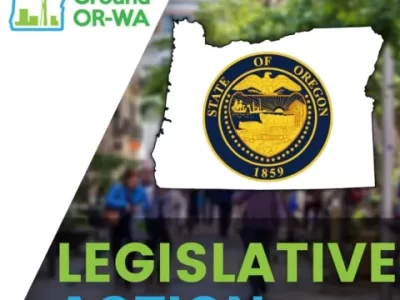Common Ground Oregon-Washington’s 2019 Legislative Session Agenda
We promote legislation that conserves the use of land and natural resources for the productive use of all residents, rather than as a commodity to misuse and to generate windfalls. We advocate the appropriation of land values as a system of incentive property taxation – to spur redevelopment and local economies, discourage land speculation, inhibit urban sprawl, promote efficient use of land, dampen land price inflation, and grow housing supply.
Published statements
Let’s Chip Away at Property Tax Inequity
“…properties in fast gentrifying areas with rising real market values, like inner Northeast Portland, pay much less than their fair share of property taxes, while properties in areas that haven’t gentrified pay more than their fair share.” [Steve Novick, former city councilor, in Portland Tribune, Dec. 27, 2018]
Property Tax Limits Weaken State Services
“Oregon is a case study of what can go wrong when states artificially limit property taxes. If Oregonians want local governments that can respond to the needs and aspiration of its residents in an equitable way, we must improve our property tax system.” [Dan Hauser, tax policy analyst, in Portland Tribune, Aug. 7, 2018]”
Report Knocks State Property Tax System
“A new report from the national Center for Budget and Policy Priorities is critical of Oregon’s property tax limits, which could be a target of reform in 2019. Supporters (of ballot initiatives I-5 and I-50) say the limits protect taxpayers from sharp annual increases in property taxes and require3 local governments to be thrifty. Detractors say the system, which taxes owners on the assessed value of a property rather than its real market value, creates significant disparities in property taxes, even between similar properties in the same area.” [Claire Withycombe, Portland Tribune, July 31, 2018]
Cities Push Reforms to Increase Property Tax Revenues
“As legislators set to work on balancing the state’s budget, some lawmakers and lobbyists are considering property tax reform to benefit local government budgets. In particular, supporters want to change how property taxes are calculated, and remove limits on tax rates. The state’s cities advocate a “transition” back to real market value-based calculations and for permitting local voters to approve rates exceeding the limits established by Measure 5.” [Claire Withycombe, Portland Tribune, February 13, 2017]
Brown Ready to Tackle Property Tax Inequities
“Gov. Kate Brown says she plans to work with state lawmakers in 2019 to craft a ballot referral to reform the state’s property tax system. Sen. Mark Hass said the state property tax system is in a state of collapse. ‘I wish the governor was calling a special session to address these and other tax issues… a much bigger problem.’” [Paris Achen, Portland Tribune, May 22, 2018]
Legislation
The OR-WA chapter of Common Ground-USA has submitted two legislator requests, one to Sen. Boquist (R-Dallas), now Senate Bill 702, and one to Sen. Beyer (D-Springfield), for the following bill:
______________________________________________
Other legislative action we support:
HB 2020, the historic “Clean Energy Jobs” bill. Follow the progress of the bill in the Carbon Reduction Committee. Oregon legislators are poised to pass a pollution-busting bill and put Oregon on track to meet its climate goals.
HB 2001, would re-legalize duplexes, triplexes, quads and cottage clusters in all neighborhoods of the state’s larger cities, towns and unincorporated suburbs. It lowers the bar to homeownership, it makes neighborhoods more renter-friendly, it gives more Oregonians the ability to prioritize the location of their home over its size, and it chips away at the invisible walls that separate our communities by wealth and income.
SB 5334. Washington state lawmakers will have the opportunity to give condo production a shot in the arm by reining in frivolous lawsuits. Condo buyers can put more of their dollars into the actual home they’re purchasing—dollars that otherwise would have lined the pockets of lawyers and insurance companies.




